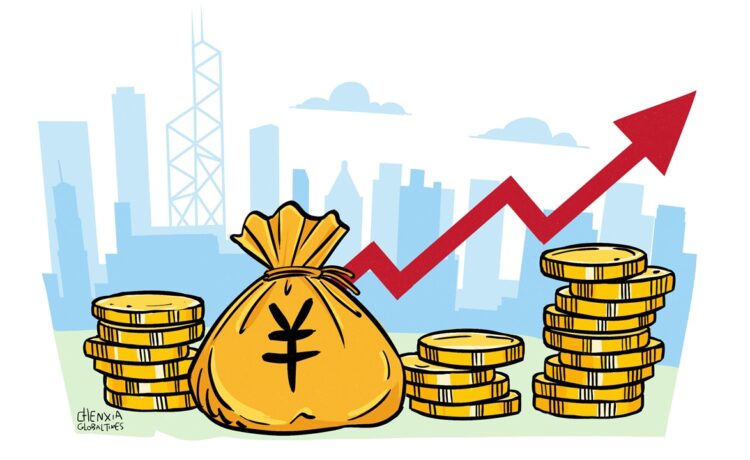
Illustration: Chen Xia/GT
Amid rising global economic uncertainties and ongoing trade tensions with the US, the yuan has recently faced renewed pressure, prompting some Western media outlets to revive narratives of yuan depreciation.
Such voices are misguided and completely ignorant of the signals from China’s central bank. China’s determination to defend its currency and prevent any speculative forces from creating financial chaos cannot be underestimated.
It seems that Western media outlets never tire of using every opportunity to play up market concerns over the yuan’s fluctuations. A Bloomberg report on Monday cited the increase in China’s foreign-currency deposits as saying it signals concerns over potential yuan depreciation.
As the dominant force in the global economic and financial systems, the US has become a significant source of these expanding risks. Factors such as US monetary policy, rising debt levels, and trade policies have introduced uncertainties that threaten the global economy, trade and the financial sector.
In this challenging environment, stabilizing the yuan’s exchange rate has become increasingly crucial. The currency’s stability is not only vital for China’s financial health and economic development but also has far-reaching implications for financial stability across Asia and the world.
In this sense, implying yuan depreciation pressure solely based on the increase in foreign-currency deposits is both one-sided and irresponsible. If anything, the rise in foreign-currency deposits can be attributed to a combination of factors.
In the context of increasing global economic uncertainty, Chinese businesses and households may ramp up foreign-currency deposits to diversify their asset allocation and mitigate risks. Also, interest rate differentials may drive investment capital toward foreign-currency assets with higher yields. Chinese households may also kick off foreign-currency conversion as the annual quota resets at the beginning of each year. Additionally, seasonal factors, such as year-end corporate settlements and financial planning, may lead to a short-term increase in foreign-currency deposits.
China’s response to speculative pressure has been consistent, and the People’s Bank of China’s (PBC) recent actions are clear enough to demonstrate China’s robust policy toolkit and unwavering commitment to maintaining the stability of the yuan.
On Friday, the central bank completed the tender of 60 billion yuan ($8.2 billion) worth of central bank bills in Hong Kong, marking the second time this year it has used the policy tool to stabilize the yuan. Offshore central bank bills play a crucial role in regulating the liquidity of the offshore yuan, serving as an important tool for the central bank to stabilize exchange rate policy.
Previously, when the yuan’s exchange rate faced great depreciation pressure, the PBC would issue offshore central bank bills, releasing a policy signal to stabilize the yuan. At the current juncture, the PBC’s use of the policy tool has undoubtedly showed the policy intention of firmly maintaining exchange rate stability.
Meanwhile, in the fourth-quarter monetary policy report released by the PBC, the central bank said it would “choose the opportunity to adjust and optimize the intensity and pace of policies based on domestic and foreign economic and financial conditions.”
The PBC will firmly prevent risks arising from exchange rate overshooting so as to keep the yuan exchange rate basically stable at an adaptive and equilibrium level. It will firmly defending the bottom line whereby no systemic financial risks will occur, according to the policy report.
Furthermore, China’s economic fundamentals and its vast foreign exchange reserves further bolster the case for yuan stability. This, combined with the PBC’s proactive measures, ensures that China has both the tools and the resolve to stabilize the yuan.
More importantly, with the internationalization of the yuan, the currency has played an increasingly important role in international trade settlement. China’s success in defending its currency is also a crucial support for regional financial stability. China will not allow the yuan to become a playground for speculators.




